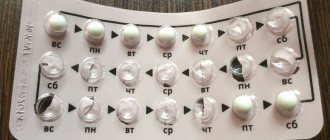The pregnancy planning stage is important for both parents, since the health of the unborn child directly depends on the state of their body at the time of conception. An important aspect of preparing for this event is the ban on taking certain medications. Many drugs for systemic diseases have the ability to accumulate in the body and penetrate the cells of the fetus, so any drug treatment must be coordinated with the attending physician.
What is needed to successfully plan a pregnancy?
- Consult a gynecologist
- with this doctor you can undergo an examination and find out whether everything is in order with your medical history, or whether there are problems that should be taken into account already at the stage of pregnancy planning.
You can also get smears from a gynecologist for STDs
(sexually transmitted infections, sexually transmitted diseases) and
cervical oncocytology
. Don’t run around unnecessarily doing, for example, a genetic test - this is not as important as consulting an attentive gynecologist when planning a pregnancy. - Do an ultrasound of the pelvis and an ultrasound of the mammary glands.
to undergo mammography
when planning pregnancy .
It should be remembered that a woman’s age is one of the most important factors that affects the ability to conceive and bear a healthy child! If you are over 35 years old
, then you should approach the issue of pregnancy planning especially carefully. - Take a biochemical blood test together with the future father
- this is the main test for HIV, AIDS, syphilis, hepatitis B and C. - Consult with a therapist or the specialist doctor for whom you have chronic diseases.
For example, if you have gastritis, contact a gastroenterologist, hypertension - see a cardiologist, tonsillitis - see an ENT doctor. During pregnancy, you need to treat your body with special care and strictly limit your medication intake. Therefore, it is necessary to take steps in advance to prevent exacerbation of chronic diseases and consult with the right doctors on how to behave during pregnancy. If you or your husband take any medications (cardio, hormonal) on a regular basis, check with a doctor of the appropriate specialization to see how they affect fertility (including your spouse) and pregnancy. You may need to stop taking some medications or replace them with others. - Treat your teeth
- again, it is not advisable to treat your teeth during pregnancy due to restrictions on medications (this includes anesthesia) and pain that causes acute discomfort. In turn, chronic caries can lead to pregnancy complications, including miscarriage and premature infected birth. Pregnancy can provoke caries and inflammation of the gums, if there are prerequisites for this. After registering for pregnancy, a visit to the dentist is mandatory, but dental treatment should be done at the stage of pregnancy planning. - Get rid of excess weight
— by the third trimester of pregnancy, women gain weight from 7 to 20 kg. Such weight gain is considered normal and even correct, but not if your BMI exceeds 25 (overweight) and especially 30 (obese). Being overweight can indicate hormonal imbalances and is often associated with diabetes, which is quite dangerous during pregnancy. With elevated blood sugar, the kidneys are especially affected - intoxication of the body occurs, which can lead to intrauterine death of the fetus.
- Choose the optimal type of sport
- at the stage of pregnancy planning, as well as in the first trimesters, physical activity is not only not contraindicated, but even necessary. However, you should avoid extreme sports and excessively intense exercise, giving preference to swimming, walking, yoga, and dancing (without acrobatics).
If a woman has successfully passed all examinations, but within 1 year the couple cannot conceive a child
, you don’t need to immediately contact a fertility specialist at an IVF center.
The future dad should contact a urologist for a spermogram
.
Thus, you should start with a consultation with an obstetrician-gynecologist. This is your primary doctor who, after an examination, will give individual recommendations on what is needed to plan a pregnancy. Moreover, you cannot do without professional help if:
- You are taking contraceptives (COCs);
- You have menstrual irregularities;
- You are over 35 years old;
- You have a history of chronic diseases;
- You tried to conceive a child, but the marriage has been infertile for more than 1 year;
- Previous pregnancies ended in miscarriage.
Drugs
If spouses want to conceive a child, they should review the first aid kit and all the medications that are in it. All medications must not cause harm to the expectant mother and her baby. If you need to take any medications, you should definitely consult your doctor first. The specialist will select the safest medications. When a doctor prescribes any medications in a clinic during any treatment, he should be reminded about plans to conceive a child. In this case, you need to use safe treatment, as well as methods that will help you conceive. This may include aromatherapy, geomeopathy and the use of herbs. The hemopathic course
should be used by both spouses. It improves and strengthens health, restores natural balance, and improves immunity. To relax their bodies, expectant mothers are advised to take a bath to which chamomile, lemon balm, and lavender oil are added. Lemon and peppermint oils are great for fighting fatigue. It is recommended to massage periodically. In addition, there are certain herbs that can help you conceive a child. These include ginseng, Chinese angelica, and wild yam. These herbs have a positive effect on hormonal balance. To improve vitality, use ginger and cinnamon. But valerian or motherwort can cope with stress.
What should you not do when planning a pregnancy?
- Drinking alcohol
- it is better to avoid alcohol at the stage of pregnancy planning, and already during pregnancy it is strictly contraindicated. Through the placental barrier, alcohol penetrates into the undeveloped liver of the fetus, which cannot process it. Alcohol during pregnancy significantly increases the risk of premature birth, miscarriage and abnormal fetal development. Pregnancy in the early stages is difficult to notice in time, so it is better for the expectant mother to completely avoid alcohol. - Smoking
- when planning a pregnancy, you need to quit smoking. It is with this bad habit that cases of miscarriages and sudden infant mortality are often associated. - Taking some medications without a doctor’s prescription and, especially, toxic substances
- even the unreasonable use of dietary supplements and multivitamin complexes may not be beneficial for the expectant mother. After all, it is better to obtain all useful microelements naturally from a varied and rational diet. Therefore, it is better to consult a doctor regarding any medications when planning pregnancy.
Dietary technique
This technique consists in the fact that a woman must adhere to a certain diet. It will affect the body in such a way that it will be possible to conceive a baby of the desired sex. If the couple dreams of a boy, then the diet should contain food that is saturated with potassium and sodium ions, but there should be few magnesium and calcium ions. The following products are suitable for this:
- meat;
- legumes;
- sausages;
- potato;
- smoked food;
- peaches, etc.
But to conceive a girl, the diet menu should contain food that contains a lot of calcium and magnesium ions, and low potassium and sodium ions. It could be greens, dairy products. You should follow the diet from the beginning of the menstrual cycle until the planned day of conception.
Nutrition and vitamins when planning pregnancy
The diet of both future parents planning the birth of a child should be varied and healthy - foods with synthetic food additives and dyes should be avoided. Give preference to natural and healthy foods
.
Eliminate trans fats and gradually give up processed foods, foods with a long shelf life, soda and other artificial drinks. There is no universal nutrition plan or program when planning pregnancy, but both women and men should adjust their diet
and switch to healthy foods.
In the first month of conception, when a woman does not yet know about her pregnancy, the process of formation of the child’s body in the mother’s womb begins. Therefore, it is necessary to correct in advance the deficiency of minerals, nutrients and vitamins, which play a vital role in the structure of cells and body systems.
Folic acid when planning pregnancy
Folic acid is responsible for cell growth and cell DNA preservation, and also reduces the likelihood of developing tumors of the uterus (fibroids) and pelvic organs. It should be taken 3 months before the expected conception in the amount of 0.4 mg per day.
Continue to take folic acid during pregnancy - it reduces the risk of developing neural tube defects in the fetus. Folic acid is found in nuts, citrus fruits, greens and legumes, but the amount may not be sufficient. When planning a pregnancy, folic acid increases a woman’s fertility, and already during pregnancy promotes the healthy growth of the embryo.
Vitamins E, D, A when planning pregnancy and other nutrients
4-6 months before conception, pay attention to vitamins E, A and D.
They increase a woman’s ability to conceive and are responsible for the formation of the baby’s skeletal system.
Vitamin E (tocopherol) in its molecular composition is close to the sex hormones - estrogen and progesterone, which are responsible for ovulation and the development of the mammary glands. But this does not mean that men should not neglect this vitamin, since it also contributes to the production of active sperm. Vitamin E is found in dairy products, eggs, and beef liver. “Sunshine” vitamin D is found in chicken eggs, fish, hard cheese and butter. Sources of vitamin A are fish oil and some vegetables (tomatoes, carrots, pumpkin).
It is best for the expectant mother to take a blood (urine) test for hormones and relevant microelements (test for vitamin D, iron, folic acid) and, together with the doctor, correct the deficiencies. You should not take dietary supplements unnecessarily, especially vitamins E and A.
Who needs antiviral drugs and antibiotics
During preparation for conception, any drug may be prohibited, even a remedy for a common cold. But since ARVI reduces immunity, treatment cannot be completely abandoned, otherwise the disease may develop into a complicated form. The doctor may recommend medications with a gentle effect on the body, and if replacement is not possible, he will recommend postponing the planned conception to a later date.
In addition, antiviral drugs are necessary for women with diseases such as HIV, some forms of hepatitis, and recurrent herpetic infections. However, in each case, the prescription must be agreed with the attending physician.
The same problem arises when future parents take antibiotics, without which it is impossible to effectively treat inflammatory processes caused by any infection.
Despite the wide variety of antibacterial agents and the constant development of new generations, most of them are extremely undesirable for use during the period of preparation for conception.
This is due to the ability of antibiotics to accumulate in the body and retain the ability to influence the microflora for a long time after the end of administration. This is especially true for men, since antibacterial drugs can change the morphological properties of sperm and other germ cells. If conception occurs due to such a modified sperm, the risk of pathologies in the unborn child increases sharply.
The minimum period of possible conception after completing a course of antibacterial therapy is at least three months.
What tests need to be taken when planning a pregnancy?
Summarizing all of the above, here is the main list of women's studies and tests that should be taken when planning a pregnancy:
- Consultation with a gynecologist;
- Smear for STDs and oncocytology;
- Biochemical blood test for HIV, AIDS, syphilis, hepatitis B and C;
- Ultrasound of the pelvic organs;
- Ultrasound of the mammary glands (mammography);
- Consultation with a therapist and other doctors who deal with chronic diseases.
Additionally, a man can take a spermogram - the main test when planning a pregnancy, and also consult with a urologist (optional, only if pregnancy does not occur within 1 year). To compensate for nutritional deficiencies and restore hormonal levels (interrelated tasks), a woman can consult an endocrinologist at the stage of planning or managing pregnancy.
Ovulation technique
This technique is based on the difference between spermatozoa. It is believed that a sperm that carries a male chromosome is highly motile when compared to one that carries a female chromosome. Therefore, his chances of reaching the egg earlier increase. But a sperm with a female chromosome is able to live longer in the uterine tube, waiting for the onset of ovulation. Analyzing this, experts came up with the following assumption, which showed a true effect in 80% of cases:
- If the couple dreams of a girl, the last sexual intercourse should occur no later than 2 days before the start of ovulation.
- If a husband and wife want to have a boy, then they should refrain from intimacy for a week before ovulation. And on the date of ovulation or the next day, sexual intercourse should occur.
Pregnancy planning at the Pirogov Clinic (St. Petersburg) - let your baby be born healthy!
The Department of Gynecology and Obstetrics has been operating since the first days of the foundation of the private clinic named after. N.I. Pirogov in 1999. Our team includes the best gynecologists in St. Petersburg, who were educated in Russia and abroad (France, Finland, USA) and have many years of experience in managing pregnancy and preparing expectant mothers. We can offer our patients other benefits:
- Online consultations with a gynecologist;
- Our own laboratory and diagnostic rooms, equipped with the latest medical equipment - you can undergo an examination in our clinic quickly, without queues, and we can send the results by e-mail when ready;
- Availability of all highly specialized doctors and medical specialists in one place;
- Affordable prices for pregnancy planning and management services;
- High comfort, convenient location of the clinic in the historical and picturesque part of Vasilyevsky Island (10 minutes from the metro).
Didn't find the information you needed on the website or don't know which doctor to make an appointment with? Leave a request for a call back through our website or call us at (812) 320-70-00 - we are always happy to help you!
Weight method
This technique was developed by an Italian researcher. His name was Angelo Gagnacci. He began studying women who gave birth to children. After carefully examining 10 thousand women in labor, he noticed that a woman’s weight affects the sex of the baby. If the expectant mother weighs less than 54 kg before conception, then the likelihood of giving birth to a girl increases. It has been observed that for every 100 girls born, there are 98 male babies. But women whose weight exceeds 54 kg are more likely to give birth to boys. For every 110 male children there are 100 female children.
Vaginal cleanliness test
A bacteriological assessment of vaginal discharge can determine the presence of inflammation and determine its cause, such as a bacterial or fungal infection. Chronic vaginosis usually spreads to the cervical canal, then to the uterine mucosa, fallopian tubes, appendages, and sometimes to the urethra. The resulting infection can make pregnancy difficult and the baby may become infected.
Treatment for bacterial and fungal vaginal infections (quite often mixed infections) usually lasts 7–14 days and is relatively simple, provided that therapy is followed by both partners. Otherwise, a ping-pong effect occurs, that is, mutual infection and relapse of the disease.
Treatment uses sulfonamides, antibiotics and antifungal drugs - orally and vaginally, and in the case of treating an infection in a man - in the form of an ointment, gel or spray.











